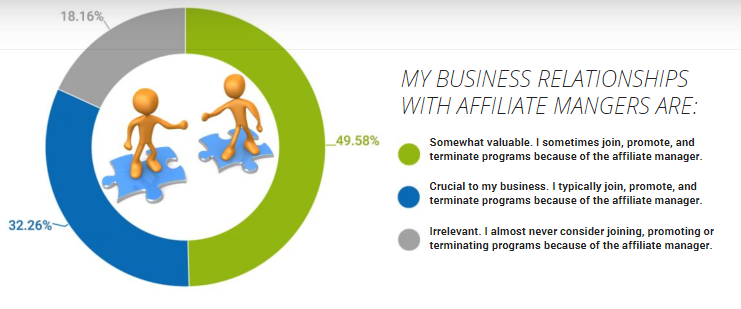I recently presented a series of insights at Affiliate Summit Europe, London, discussing the ways in which digital businesses can enhance their affiliate relationships, and the importance this has to overall success.
Below is a summary of the key points explored in the presentation.
1. Treat Your Affiliates as Partners
Brands are always looking for ways to increase their online sales through multiple channels. When it comes to affiliate marketing, brands tend to forget the importance of treating affiliates like partners and how this can affect their overall success. Most companies do not have a dedicated resource to nurture and grow their program, leaving affiliates left in the dark. For example, take a look at the AffStat benchmark report of 2016.
2. Set Yourself Apart From Competition
It’s often forgotten, but it’s free for affiliates to sign up for networks. With the software space becoming increasingly competitive, how are affiliates making decisions around what program they should promote?
An affiliate’s decisions are not only made by product reputation and competitive commission rates, but also based on where they can get the best support to receive links, feedback, brainstorming and additional information – areas that will help optimize their businesses.
Ever heard of the 80/20 rule? In most cases we’ve seen 90/10, which means 90 percent of your revenue is coming from 10 percent of your program. Depending on how many affiliates you have, in some cases this could mean there’s five affiliates running your program. Putting all your eggs in one basket leaves your program at risk.
Download the Ebook: Subscription Metrics & Reporting Tips
Start offering services not just to your top earners but take a look at your affiliate database as a whole. A service is usually associated with what is delivered to your clients, and not so much with affiliates, so it’s vital to communicate with your affiliate database. In order to communicate effectively, it’s important to understand your audience and what its requirements are. Here are some questions to ask yourself:
- How do they promote?
- Who are their customers?
- What regions are they promoting in?
- What offers are most successful for them?
- Are you offering them enough to sell?
- Is your commission fair?
- Do they have different peak seasons than your business?
3. Communication Strategy for Enhancing Relationships
Now let’s take a look at how affiliates prefer to be communicated with. Looking at the AffStat report 2016 , you can see that 84 percent prefer email communication.
Using this information as a guide, you can base your strategy around email communication, and below are a series of ways to do that:
Welcome Email
A welcome email is what affiliates receive once they’ve been accepted into a program. This is their first touch point with your brand, and you want to ensure they have a positive experience, with useful information to get started.
Examples include commission offerings, regional focus, discounts, contact person, links to get started, and custom creatives.
Newsletters
Newsletters are an effective way to share industry trends, events you’re attending and updates to your brand
Activation email campaigns
When affiliates have signed up with your network or program, and they have not yet started promoting your services, it’s important to revisit these affiliates. The question is why have they not started promoting? Have you provided enough information for them to start selling? Affiliate recruitment and activation belong together, and though it’s a challenging task to recruit affiliates, it’s even trickier to get them to promote your product or services.
Congratulate
This goes back to setting yourself apart from your competition. Focus not only on your top earners, but look at new-comers and emerging affiliates – those who are increasing in revenue over a three- or six-month time frame. Congratulating your emerging affiliates will go a long way in that it shows interest and appreciation for their efforts.
4. Affiliate Manager Best Practices
As we discussed earlier, based on the AffStat benchmark report, 80 percent of affiliates join or terminate a program because of their affiliate manager. This shows the importance and influence an affiliate manger has for the success of your business. Here are some best practices to follow.
Affiliate Marketing Managers Must:
• Engage their entire database
• Follow affiliates on social sites
• Make regular visits and host networking events
• Attend industry conferences
• Repond frequently
• Share insight on your plans
• Work together as a team
Affiliate Marketing Managers Should Not:
• Pretend to know more than they do
• “Manage” affiliates
• Find ways to cut commissions
• Ignore affiliate requests
• Allow affiliates to speak first
• Set rules and never break them
5. How to Put This Into Practice
In order for your program to become successful, you need to communicate, diversify and differentiate yourself with affiliates. Deliver a service, not just a tracking platform. So ensure that you are following the basic best practices, always respond, listen to what they have to say, and allow yourself room for exceptions when it comes to program terms. Following these steps will move you into the right direction toward a successful affiliate program.
Amy Carabini is a Senior Affiliate Marketing Manager. To learn more about Affiliate Marketing Services, contact am@cleverbridge.com.

